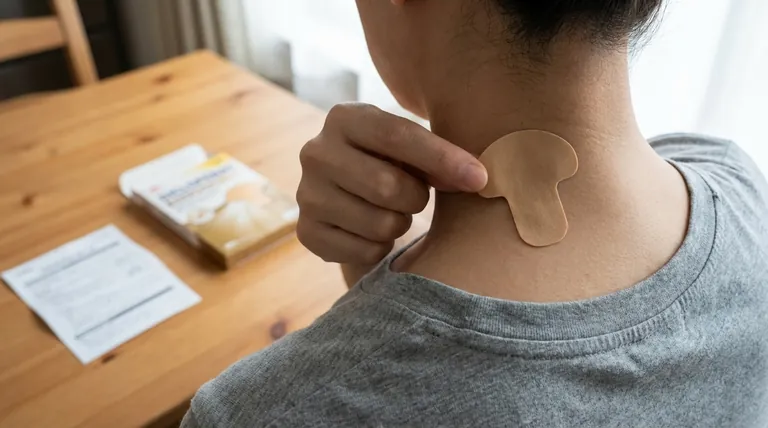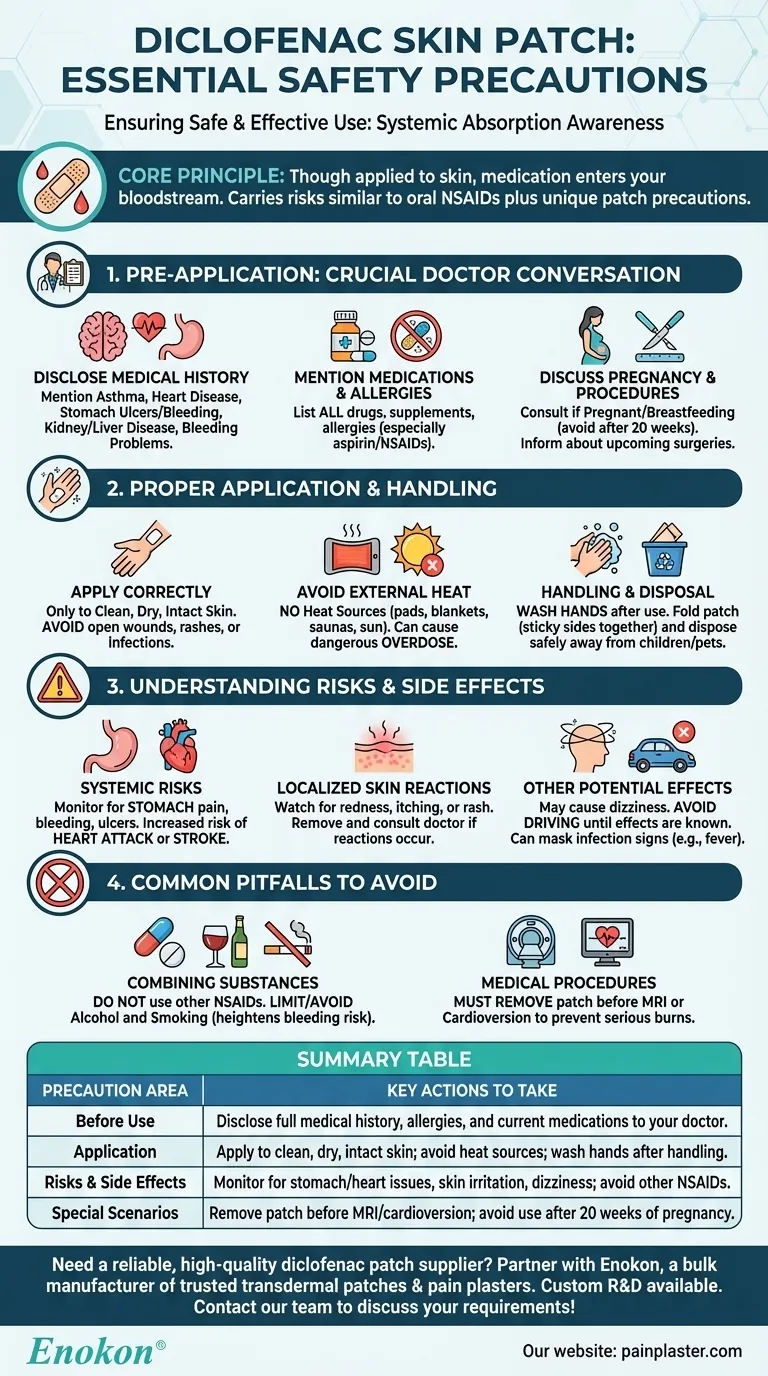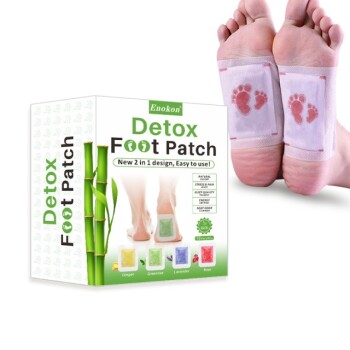Using a diclofenac skin patch requires specific precautions to ensure it is both safe and effective. You must inform your healthcare provider of your complete medical history, apply the patch exactly as directed, and remain vigilant for signs of skin irritation or more serious systemic side effects, such as stomach pain or cardiovascular issues.
The core principle to understand is that even though the medication is applied to your skin, it is absorbed into your bloodstream. Therefore, it carries many of the same risks as oral NSAIDs, in addition to unique precautions related to the patch itself.

Before You Apply: Crucial Conversations with Your Doctor
The most important safety step happens before you ever open the box. Full disclosure with your healthcare provider is non-negotiable to prevent serious complications.
Disclose Your Full Medical History
Your doctor must be aware of any pre-existing conditions. Be sure to mention if you have a history of asthma, heart disease, high blood pressure, stomach ulcers or bleeding, kidney or liver disease, or any bleeding problems.
Mention All Medications and Allergies
Inform your doctor about any allergies, especially to aspirin or other NSAIDs (like ibuprofen or naproxen). Provide a complete list of all other products you use, including prescription drugs, over-the-counter medications, and herbal supplements.
Discuss Pregnancy, Breastfeeding, or Upcoming Procedures
Use of this patch must be carefully considered if you are pregnant, trying to become pregnant, or breastfeeding. It should be avoided around or after 20 weeks of pregnancy unless explicitly directed by your doctor. Also, inform your doctor if you have any upcoming surgeries or medical procedures.
Proper Application and Handling for Maximum Safety
How you handle and apply the patch directly impacts its safety and effectiveness.
Applying the Patch Correctly
Only apply the patch to clean, dry, and intact skin. Do not apply it to open wounds, cuts, or areas with rashes or infections. Avoid applying the patch immediately after bathing or showering, as this can affect adhesion.
Avoiding External Heat Sources
Never apply heat to the patch area. Heat from sources like heating pads, electric blankets, saunas, or direct sunlight can increase the rate of medication absorption, leading to a dangerous overdose.
Handling and Disposal
Always wash your hands thoroughly after applying or removing a patch. Avoid touching your eyes, nose, or mouth after handling it. When you are finished with a patch, fold it in half with the sticky sides together and dispose of it safely, out of the reach of children and pets.
Understanding the Risks and Side Effects
While targeting localized pain, the active ingredient in the patch can affect your entire body.
Systemic Risks: Stomach and Heart Health
Like other NSAIDs, diclofenac can increase your risk of serious gastrointestinal issues like stomach pain, bleeding, and ulcers. It can also elevate the risk of a heart attack or stroke, particularly with long-term use or in individuals with existing heart conditions.
Localized Skin Reactions
Pay close attention to the skin where the patch is applied. Watch for signs of irritation, such as redness, itching, or a rash. If these reactions occur, remove the patch and consult your doctor.
Other Potential Side Effects
This medication may cause dizziness. Avoid driving or operating heavy machinery until you know how it affects you. It may also mask signs of an infection, such as a fever, so be mindful of other symptoms if you feel unwell.
Common Pitfalls and Interactions to Avoid
Certain substances and activities can lead to dangerous interactions or accidents while using the diclofenac patch.
Combining with Other Substances
Do not use other NSAIDs (oral or topical) while using the patch, as this increases the risk of side effects. It is also wise to avoid or limit alcohol and smoking, which can heighten the risk of stomach bleeding.
Medical Procedures: MRI and Cardioversion
The patch may contain metal components. It is critical to remove the patch before undergoing an MRI or cardioversion, as it can heat up and cause serious skin burns during these procedures.
Making the Right Choice for Your Health
Your personal health profile dictates the most important precautions for you.
- If you have a history of stomach or heart issues: You must have a detailed discussion with your doctor about whether the benefits of this patch outweigh the significant systemic risks.
- If you are pregnant or planning to be: The clear medical guidance is to avoid using this patch after 20 weeks of pregnancy due to potential harm to the unborn baby.
- If you are an older adult: You may be more susceptible to side effects, making close monitoring and communication with your healthcare provider essential.
- If your goal is simply safe, effective pain relief: Commit to the core habits of proper application, avoiding all external heat sources on the patch, and immediately reporting any unusual symptoms to your doctor.
Ultimately, using this medication safely depends on your awareness and a strong partnership with your healthcare provider.
Summary Table:
| Precaution Area | Key Actions to Take |
|---|---|
| Before Use | Disclose full medical history, allergies, and current medications to your doctor. |
| Application | Apply to clean, dry, intact skin; avoid heat sources; wash hands after handling. |
| Risks & Side Effects | Monitor for stomach/heart issues, skin irritation, dizziness; avoid other NSAIDs. |
| Special Scenarios | Remove patch before MRI/cardioversion; avoid use after 20 weeks of pregnancy. |
Need a reliable, high-quality diclofenac patch supplier? Partner with Enokon, a bulk manufacturer of trusted transdermal patches and pain plasters for healthcare distributors and brands. We offer custom R&D and development expertise to ensure your products meet the highest safety and efficacy standards. Contact our team today to discuss your requirements!
Visual Guide

Related Products
- Far Infrared Deep Heat Relief Patches Medicated Pain Relief Patches
- Asthma Cough and Pain Relief Patch for Adults and Kids
- Capsaicin Chili Medicated Pain Relief Patches
- Heating Pain Relief Patches for Menstrual Cramps
- Far Infrared Pain Patch Relief Pain Reliever for Back
People Also Ask
- How do Deep Heat Pain Relief Patches provide pain relief? Discover the Drug-Free Mechanism
- How do pain relief patches compare to other pain relief methods? Discover Targeted, Long-Lasting Relief
- How should pain relief patches be applied and used? A Guide to Safe & Effective Targeted Relief
- What are pain relief patches and how are they used? A Guide to Safe, Targeted Relief
- How often should pain relief patches be used? Get the Right Schedule for Targeted Relief















